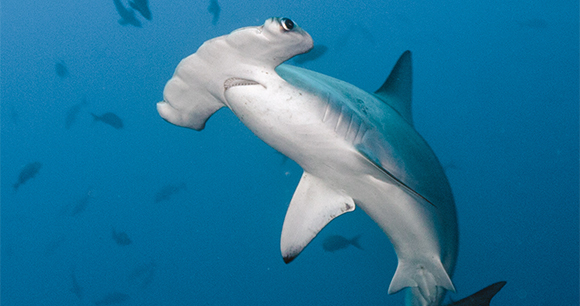
The Shark Conservation Act (P.L. 111-348) was introduced in January 2009 by Representative Madeleine Bordallo (D-GU) in the House of Representatives and Senator John Kerry (D-MA) in the Senate in April 2009. The long-awaited bill was approved by both chambers by unanimous consent on the last days of the 111th Congress in December 2010. President Obama signed the bill into law on January 5, 2011.
The bill represents a giant step forward for shark conservation as it strengthens the US ban on shark finning, the practice by which living sharks' fins are sliced off and their mutilated bodies thrown back into the ocean, where the sharks endure long, painful deaths. Shark finning kills an estimated 73 million sharks each year, driven by the demand for shark fin soup.
In 2000, President Bill Clinton signed the Shark Finning Prohibition Act, making it unlawful to possess a shark fin in US waters without a corresponding carcass. Loopholes in the ban, however, prevented effective enforcement, and finning continued. As a countermeasure, the National Oceanic and Atmospheric Administration issued regulations in 2008 mandating that sharks must be landed with fins attached in the Atlantic, Caribbean and Gulf of Mexico, but not the Pacific.
Details of the bill
- Requires all federally managed sharks to be brought to port with their fins naturally attached, bringing Pacific fisheries under the same regulation as Atlantic, Gulf and Caribbean fisheries.
- Provides clear rules for enforcement officials who were unable to identify shark species once fins were removed and therefore were unable to expose and prevent finning. Accurate species identification is imperative to ensure that endangered species are not being harvested and that finning is not occurring.
- Amends the High Seas Driftnet Fishing Moratorium Protection Act to allow the US to identify nations that do not have comparable shark conservation measures in place.
- Prohibits all US flagged vessels from having custody, control or possession of shark fins without the corresponding carcass and prohibits the transfer of fins at sea.
- Provides discretionary authority to the President to restrict imports of shark products from those countries not taking comparable actions to protect sharks.
- Includes an exemption for smooth dogfish sharks, for which a fishery exists along the Mid-Atlantic coast. The exemption allows fishermen to continue to separate fins of this species from carcasses at sea to conserve space on their boats. These fishermen will be responsible for demonstrating that the fins on their boat belong to the carcasses.
Why is this important?
Sharks have ruled the oceans for more than 400 million years and the removal of such large numbers from the ecosystem can have irreversible effects on every species in the marine web, including popular seafood such as shellfish. Since sharks are top predators, their decimation creates a ripple effect throughout the marine food web, impairing the balance of the ocean ecosystem. Sharks are particularly vulnerable, because they produce few young and reach sexual maturity late in life.
There is a global misconception that the oceans are teeming with sharks. Existing population data shows that some shark populations have declined by as much as 99 percent. Many shark species are being overfished at rates and with methods that are highly unsustainable and, as a result, are now facing extinction.
Find out more about shark finning.